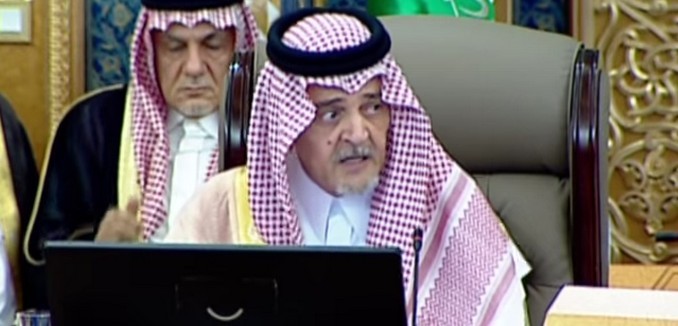Saudi Arabia has started asserting itself more in the Middle East in response to the rapprochement of the United States, long the kingdom’s most important ally, with Iran, The New York Times reported yesterday.
The kingdom, Iran’s chief regional rival, is leading airstrikes against an Iranian-backed faction in Yemen; backing a blitz in Idlib, Syria, by jihadists fighting the Iranian-backed Assad regime; and warning Washington not to allow the Iranian-backed militia to capture too much of Iraq during the fight to roll back the Islamic State, according to Arab diplomats familiar with the talks.
Through Egypt, a major beneficiary of Saudi aid, the kingdom is backing plans for a combined Arab military force to combat Iranian influence around the region. With another major aid recipient, Pakistan, Saudi Arabia is also expected to step up its efforts to develop a nuclear bomb, potentially setting off an arms race in the region.
The Times quotes a number of Arab public figures who articulated the fear, mistrust, and doubt that Saudi Arabia and other Sunni states feel in the wake of America’s outreach to Iran during the ongoing nuclear negotiations. “Taking matters into our own hands is the name of the game today,” said Jamal Khashoggi, a prominent Saudi journalist. Former Egyptian foreign minister Nabil Fahmy predicted that “you will see more direct Arab responses and you will see a higher level of geopolitical tension in the whole region.”
The article asserts that “President Obama has argued that a verifiable deal is the best way to secure the Arab states” by ensuring that Iran does not develop nuclear weapons. However, many leading Arab thinkers don’t find the nuclear talks reassuring, as an Egyptian political scientist explained:
“There is a disbelief in the Arab world that these negotiations are only about the nuclear file, and a frequent complaint here is that we are kept in the dark, we are not consulted,” said Gamal Abdel Gawad Soltan, a political scientist at the American University in Cairo. “The U.S. is much less trusted as an ally, as an insurance policy towards the security threats facing the governments in the region, and so those governments decide to act on their own.”
Before the Houthis expanded their control of Yemen, Jonathan Spyer mapped the scenario currently being played out in the Middle East in Confidence Game: Losing American Support The Gulf States Scramble, which was published in the January 2014 issue of The Tower Magazine.
The Middle East’s bloc of Shia Muslim powers, led by Iran, is far more formidable than its Sunni opponents. Wherever the rivalry between them has reached a flashpoint, the Shia have gained the upper hand. The Iranians have won in Lebanon and Iraq, and are winning in Syria. The Sunni Arab states are either mired in internal turmoil or are too weak to effectively resist Iranian ambitions without outside (American and, perhaps, Israeli) assistance. From the point of view of the current U.S. administration, logic appears to support the idea of distancing oneself from former allies and reaching an accommodation with the new strong force in the region—Iran and its proxies.
The Gulf states are aware of this and deeply worried by it. But for supporters of the accommodationist point of view, this is not such a terrible thing. Working on the assumption that Iran, while a formidable foe, has goals that can be satisfied without completely overturning the regional status quo, the accommodationists presumably believe that the Gulf states will eventually calm down and get used to the new situation.
But all of this depends on a very large assumption: Namely, that Iranian ambitions can be satisfied within the current framework. If it turns out that Iran’s anti-Western stance and activities are not merely posturing, and that Tehran does indeed intend to replace U.S. hegemony in the Gulf with a new hegemony of its own, then what is currently going on is inelegant capitulation in the face of an aggressor. In Riyadh (and Jerusalem), that’s what it looks like.
Given the record of Iranian obfuscation on the nuclear issue and largely successful subversion across the region, the Saudi (and Israeli) view has a lot going for it. The U.S. does indeed appear to have adopted a strategy rooted in illusion. The question now is what the formerly US-led bloc will do in order to organize itself effectively against the Iranian challenge and eventually turn it back.
[Photo: AFP news agency / YouTube ]




